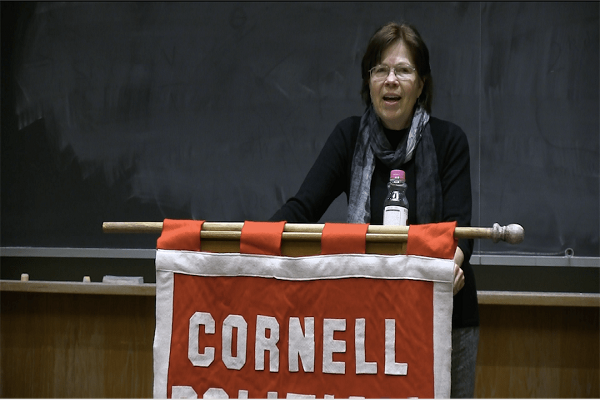Bipartisan Opposition to Close Ties with Riyadh Expected Under Biden: US Scholar

“Biden’s middle eastern policy is a puzzle. He will likely try to go back to an agreement with Iran. But he is less favorable to the Palestinians than Obama or Bernie Sanders, so hard to see a breakthrough there. There is going to be a bipartisan opposition to a close relationship with Saudi Arabia,” Elizabeth Sanders told IQNA in an interview.
Professor Sanders's principle research interests lie in American political development and popular politics. Her other research and teaching interests include: the rise (and fall) of U.S. economic regulatory institutions, the executive branch generally, foreign policy, social movements, urban ecology and sustainability, and struggles to democratize governing processes.
Following is the text of the interview:
IQNA: Recent events in the US Congress were unprecedented in the political history of this country. What are the causes of these incidents?
Sanders: Most essentially, it’s the rise of economic inequality that so damaged the US working class after 2000. Bill Clinton’s turn to neoliberalism gave us trade agreements that took away millions of industrial jobs and greatly weakened labor unions.
He also adopted a new party orientation that would attempt to replace the white working class, in particular, with presumably more docile and agreeable immigrants. See the jump in inequality after Clinton takes office in 1992. Bernie Sanders fought Hillary Clinton for the Democratic nomination but lost with the help of her control of the National Committee and huge treasury from banking and other elite sources.
The defeat of Bernie Sanders paved the way for Trump’s victory: someone who shared Bernie’s trade and immigration policy orientations as well as the opposition to regime-change wars (whose prevalence continued under Obama and his Secretary of State, Clinton). Trump was/is an outsider spending his own money in 2016.
Many who voted for him hated his personality (many hated Hillary’s, too) but opted for his economic policies and attention to the downwardly mobile, non-college educated working class. A vote for Clinton meant more of the same neoliberalism, foreign policy, and elite control. That’s how we got Donald Trump. Had it not been for the pandemic, which was the main issue that ended the economic upturn under Trump and gave his liberal opponents a big issue to use against him (“It is not China, but Donald Trump who is responsible for all the American illnesses and deaths” was the claim), he’d likely have been reelected.
IQNA: Some believe that this election and its aftermath show, above all, a deep rift in US domestic politics. What is your opinion?
Sanders: There certainly is a deep rift between elites and the downwardly mobile working class. It’s not going to go away any time soon. Biden outspent Trump, and is very close to lobbyists representing elite interests (especially banking and Big Tech). None of his appointees represent the Bernie Sanders wing of the Democratic Party. And an open borders policy on immigration, plus a return to globalist trade policies will make things harder for the working classes.
Interesting to see the increase in Trump votes among ethnic minorities who may have been repelled by Trump’s social policies, but liked the economic orientations. One can imagine a future Republican candidate with far more institutional experience and a less repellent personality building on the working class orientation.
IQNA: How do you predict the political future of Donald Trump after these events?
Sanders: I think he will try to retain participation at least in endorsing candidates he sees as his supporters. But I don’t think he can win the nomination of the GOP again. He’s gone way too far since Nov. 3. Jan 6 was a great blow to his reputation.
He’ll always be an angry, vindictive man, but surely has lost much of his remaining appeal. The country, and the world, are done with Donald Trump. Way too stressful and divisive.
IQNA: How do you think these events will ultimately affect the performance of the Biden administration on foreign policy?
Sanders: Biden’s middle eastern policy is a puzzle. He will likely try to go back to an agreement with Iran. But he is less favorable to the Palestinians than Obama or Bernie Sanders, so hard to see a breakthrough there. There is going to be a bipartisan opposition to a close relationship with Saudi Arabia.
China is the big mystery. Clinton and Obama were very indulgent of China. That’s harder now, given the pandemic, the increase in China’s aggressively nationalist expansionism, and its hard-to-ignore repression of its own citizens and Hong Kong democracy. Not to mention the downside of China’s control of essential product lines. So, China policy will be tougher than under Clinton/Obama, but less hostile than Trump’s.
Big Tech and corporate interests in maintaining China positions will be very significant in maintaining US-China relations. A very big difference between Trump and Biden.
Biden is a more corporate-friendly president than Trump, in most cases, considering Biden’s experience in politics, his financial ties, and his appointment of lobbyists to high positions.
Interview by Mohammad Hassan Goodarzi
 Most Commented
Most Commented 


